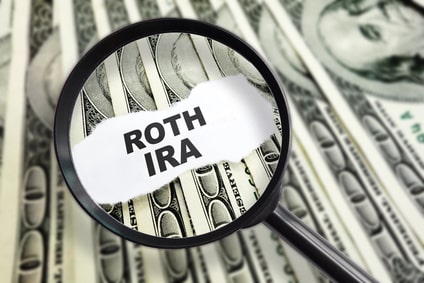If you are considering converting your IRA to a Roth IRA make sure you know the details
I’ve been blessed to talk about Retirement Planning on my weekly radio show for almost a decade. My show airs four times per week on multiple stations. One of the most common questions I am repeatedly asked is, “Should I convert my IRA to a ROTH IRA?” This is often a loaded question. And the answer is: “It depends on the purpose for the account you are considering converting.” There are many things to consider before making this decision. However, if you take your time and do your homework, the right choice could save you thousands of dollars in future taxes. Let’s consider the question together.
I will be quoting and using information from Ed Slott to answer this question. He is America’s IRA Expert. In my opinion, no one on the planet knows more about IRAs and ROTH IRAs than Ed Slott. I personally own Roth IRAs, and I’ve owned them for over a decade. As a retirement income planning specialist, I have taught hundreds of clients how to develop tax-free income streams that will last the rest of their lives. I write about this in my book, Safe Money Matters. In Chapter 8 of my book, “Tax-Free beats Taxable every time,” I talk about the importance of having tax-free income streams in retirement. I show clients how to get guaranteed lifetime income streams that they can never outlive, taking away the #1 fear of retirees today, which is running out of money before they run out of life.
I’m a big fan of the Roth IRA because once you convert and pay the taxes, your retirement account will grow tax-free forever. I have personally done multiple Roth conversions. During the stock market crash of 2008, I converted two qualified accounts to Roth IRAs, and they have been growing tax-free for over a decade. Yes, it was painful when I paid the taxes on that conversion back in 2008. However, both of those accounts are now double their original value in 2008, and all the money inside those accounts are forever tax-free. This was one of the best financial decisions I ever made. Then, in 2018, after the new tax laws lowered my tax bracket, I converted another IRA to a ROTH.
Let’s consider a few things you need to be aware of if you are thinking about a Roth conversion. Recent tax law changes made all Roth conversions permanent. You can no longer undo a Roth conversion like you could in the past. This was called a Re-Characterization. When you do decide to convert to a Roth, you must be fully committed to paying the taxes due on the conversion by the next April 15th. Keep in mind, if your IRA is worth $100,000, you will be adding $100,000 to your earned income for that tax year. There is no undoing this decision once you convert to a ROTH, so this must be taken into consideration. I would urge you to show your specific conversion figures to your CPA before pulling the trigger on the conversion and get the projected tax cost associated with adding this conversion to your taxable income for the year.
If it helps to reduce your tax bill, you can convert just part of your IRA and then convert the rest over multiple years. This will lessen the tax bill each year, as opposed to ripping the band-aid off and taking the tax hit all in one year. I call these “MINI” Roth conversions. The goal is to turn taxable money into forever tax-free money in the most tax efficient way possible. If it takes 5-10 years to do that, that’s ok. If you can afford the tax hit all at once, then yes, the Roth conversion will grow tax-free for both you and for your beneficiaries from the day you convert. Also, unlike a traditional IRA, your Roth IRA has no required minimum distributions at age 70 1/2, so your Roth funds can continue to grow tax-free for the rest of your retirement years.
Ed Slott often says, “When you are considering converting an IRA to a ROTH IRA, there are many things to consider.” There are reasons to do it, and there are reasons not to do it. We’ve already talked about one of the reasons that might keep you from doing a ROTH conversion, which is having to pay the immediate tax bill that comes with it. Here’s another potential reason not to convert: If you believe you will be in a lower tax bracket in retirement, it may not make sense to convert now. The important thing is, no one knows how high taxes might be in the future. Don’t ever forget, our nation’s tax deficit is almost 22 Trillion dollars and growing every second! Tax rates are currently at the lowest rate they have been for many years, which is why I like the idea of converting a taxable IRA to a tax-free Roth IRA at the lowest possible tax cost. But keep in mind, this means you will have to pay the upfront tax now instead of deferring those taxes until a later time.
I like the idea of removing the uncertainty that comes from guessing what future tax rates are going to be. Converting to a Roth IRA takes care of this. No matter what future tax rates are, the money inside your Roth will come out completely tax-free. I also like the idea of having my retirement account bought and paid for. To borrow a phrase from my friend and mentor Ed Slott, he will often say something to the effect that you think you own your IRA. You don’t own it. It has a mortgage on it. And you will owe Uncle Sam whatever amount of tax he says you owe him when you take the money out. And that’s not freedom! I want freedom in my retirement, and that’s why I own Roth IRAs and life insurance.
Here’s are some primary reasons FOR doing a Roth conversion: Your Roth IRA will compound income tax-free inside the account until you decide to start taking distributions. This benefits you, your spouse and your heirs. They will never pay taxes on the distributions from your ROTH.
I can’t stress this one enough: There are NO required minimum distributions (RMD’s) on your Roth IRA. And, there are no RMD’s for a spouse who moves inherited Roth IRA funds over to his/her own Roth IRA after the owner of the ROTH dies. This is a big deal!
If future tax rates increase, tax-free Roth IRA income will be even more valuable. Just imagine how valuable this would be if tax rates return to what they have been in the past. Just take the time to look up the historical tax rates in the US for the past 75 years. You might be shocked to know what the average has been. Roth IRAs remove the uncertainty of what your future tax rates might be.
Here are some fundamental reasons you might choose NOT to convert your IRA to a ROTH IRA: You must pay the income tax upfront. This means paying a tax that would be postponed if you don’t do the conversion. Roth IRA conversions cannot be undone. Once the conversion is done, you owe the tax, and the following tax deadline must pay it.
If you have started taking your Social Security income payments, you need to consider the extra tax the Roth conversion would create on your Social Security. Also, if you are above the age of 65, you need to consider the potential higher Medicare Part B and D premiums this might cause. Finally, you might have to pay estimated taxes because of the conversion. So be sure to talk to your CPA before making any decisions.
To convert or not to convert, that is the question. Uncle Sam says, you will either pay me now, or you will pay me later. So, which will it be? I personally believe there are a lot more reasons FOR doing a conversion than for NOT doing a conversion, but it does depend on the age and the situation you find yourself. Before making this decision, take your time, do your homework and make the right choice. It could save you and your heirs’ thousands and thousands of dollars in future taxes. And don’t ever forget, tax-free beats taxable every time!





